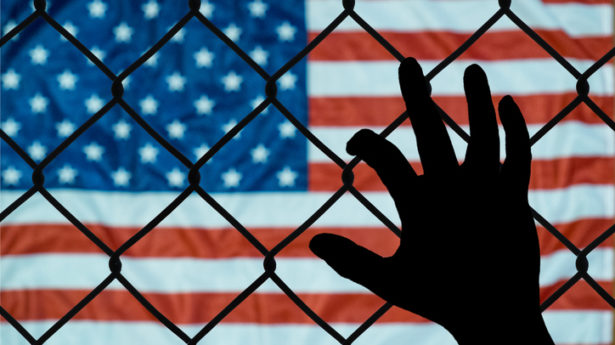The Unitarian Universalist Service Committee advances human rights through grassroots collaborations.
Unpacking Trump’s Latest Immigration Demands

By on January 9, 2019
Last night, the President trotted out a new persona in an effort to rebrand his destructive immigration policies as a “humanitarian” response to an alleged national crisis. In a much-hyped televised address, Trump delivered short, carefully scripted remarks that brazenly mischaracterized his proposal to restrict the legal rights of unaccompanied minors as an effort to ensure that children “can be safely and humanely returned back home,” while seeking to portray his administration as a statesmanlike party to shutdown negotiations.
Don’t be fooled. The administration’s slickly-tailored P.R. stunt cannot obscure the fact that their policies threaten immediate harm to children and families seeking safety in the United States, nor that Trump’s speech perpetuated the same racist and fear-mongering lies about immigrants he has used in the past.
Here’s what Trump’s proposals would actually mean for refugees, children, and families, if the administration gets its way:
- Children and families could be held behind bars indefinitely.
In his speech last night, Trump bizarrely sought to portray himself as open to reasonable negotiations to end the government shutdown, stating that “[t]his situation could be solved in a 45-minute meeting.”
In reality, Trump’s administration has persistently escalated their demands in recent weeks, seeking to enact increasingly extreme measures by means of a crisis of their own making. The $5.7 billion dollars that Trump is now demanding to fund physical barriers along the border far exceeds the $1.6 billion that the president himself requested for “construction of the border wall” in his budget request for Fiscal Year 2019.
More outrageously still, the administration is now seeking to pass a host of legislative rollbacks to the rights of asylum-seekers through Congress in exchange for ending the shutdown, holding federal employees hostage to a series of demands that U.S. legislators have repeatedly rejected in the past.
Trump claimed last night that he has “asked Congress to close border security loopholes,” likely referring to a letter the administration sent to legislators on January 4. What the president here and elsewhere calls “loopholes” are in reality a binding legal agreement – the Flores Settlement – which governs the treatment of children and families in U.S. immigration detention and a 2009 law protecting trafficking victims.
By asking Congress to undo the Flores Settlement – which the administration has already tried to reverse in a legally dubious regulation earlier this year – Trump is trying to get around a 20-day limit U.S. courts have placed on the length of time children traveling with their families can be held in detention. If he succeeds in reversing this rule, children in family units could be held behind bars indefinitely.
- Unaccompanied refugee children could be deported without a hearing.
The other legal protection the administration is seeking to end is a 2009 law designed to protect trafficking victims, which mandates that unaccompanied minors from countries not directly bordering the United States – such as refugee children from Central America – are entitled to a full immigration court proceeding. Trump’s proposed change would subject these children to an “expedited removal” proceeding instead, which currently applies to adults, family units, and children from Mexico or Canada.
“Expedited removal” would mean that children fleeing violence in Central America would have to convince U.S. agents that they have a “credible fear” of persecution, before ever getting a chance to present their case to an immigration judge. When Trump speaks of closing “loopholes,” what he really means is scaling back legal protections and denying due process to children who are fleeing for their lives.
- In-country processing would pose new dangers for refugees.
As a “trade-off” for these potentially life-threatening changes to current asylum procedure, figures in the administration have recently floated a proposal to change the law so as to allow children to apply for asylum at U.S. embassies in their home countries.
While this model of in-country processing can play a legitimate role in a broader protection response, if it is understood to be one avenue among many for seeking asylum, it is profoundly misguided to present it as a replacement or “alternative” to traditional asylum-seeking, as recent history has shown.
In its earlier Central American Minors (CAM) program, the Obama administration previously tried to present in-country processing as an alternative to the dangerous migration route to the United States, using the program rhetorically to justify its harsh crackdown on asylum-seekers at the border. UUSC published a substantial report on the CAM program in 2016, showing that – while CAM saved lives and proved a success for some families – it could not possibly provide a safe “alternative” in all instances for children seeking safety.
First and foremost, refugees are by definition people who have to flee the place they call home. To propose that asylum-seekers wait for months or longer while they are processed betrays a fundamental misunderstanding of the refugee situation. As the report stated, “Most asylum-seekers at the border note that they could not wait a year for the CAM application to process.”
***
Apart from threatening these harmful policy impacts, Trump’s speech last night also once again recycled hateful misinformation about immigrants and refugees. Abusing the moral authority of the Oval Office in order to reach the American people with his message at prime time, Trump described in lurid detail a series of murders allegedly committed by undocumented immigrants, making a false link to his own border policies as a solution.
This effort to stigmatize and exclude an entire group of people on the basis of anecdotal descriptions of alleged actions of a few individuals is the essence of racist rhetoric. To hear it emanating year after year from the highest office in the United States is a national tragedy and a fundamental threat to the institutions of a free society.
We must never forget that the asylum process the administration is seeking to upend is one on which thousands of people rely in order to survive. UUSC rejects and will continue to speak out against any effort to pervert our nation’s institutions in furtherance of a racist, xenophobic, and rights-denying agenda.
Photo Credit: iStock – tcareob72

